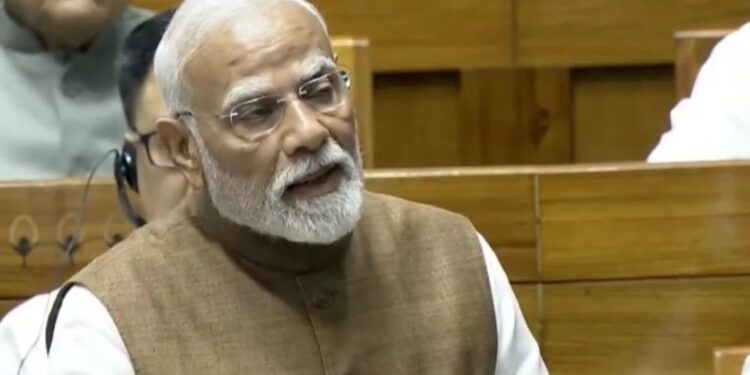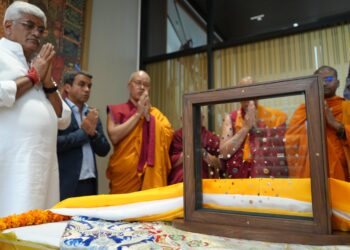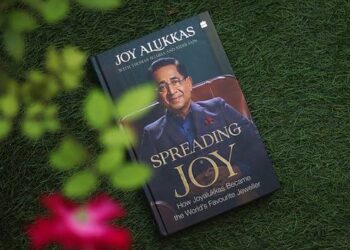New Delhi, July 29, 2025 – Indian Prime Minister Narendra Modi addressed the Lok Sabha during the ongoing Monsoon Session of Parliament, expressing profound gratitude to the citizens of India for their unwavering support during Operation Sindoor, a decisive military response to the April 22 terror attack in Pahalgam, Jammu and Kashmir. The operation, which targeted terrorist infrastructure in Pakistan and Pakistan-occupied Kashmir, has been hailed as a landmark demonstration of India’s resolve against cross-border terrorism.
“I am indebted to the people of the country who supported me during Operation Sindoor,” Modi said, describing the Parliament session as a “Vijayotsav” or celebration of victory over terrorism. “The way the people of the country stood by me, blessed me, I express my gratitude and salute the countrymen,” he added, emphasizing the unity and trust displayed by the nation during the critical operation.
Operation Sindoor: A Bold Response to Terrorism
Operation Sindoor was launched in retaliation to the Pahalgam attack, which claimed 26 civilian lives. The operation, involving precision air and ground strikes, targeted terror camps in Pakistan and Pakistan-occupied Kashmir, neutralizing key terrorist infrastructure. Modi highlighted the operation’s success, noting that it “destroyed terror sites within minutes” and sent a clear message that “nuclear blackmail will not work anymore.”
The Prime Minister underscored India’s new doctrine against terrorism, stating, “We now respond on our own terms, at our chosen time, and do not differentiate between masterminds of terror and state actors.” He also clarified that no foreign leader, including U.S. President Donald Trump, influenced India’s decision to pause the operation, refuting claims of external mediation.
Parliamentary Debate and Opposition Critique
The Lok Sabha debate on Operation Sindoor saw intense exchanges, with the opposition, led by Congress MP Rahul Gandhi, questioning the government on alleged security lapses that allowed the Pahalgam attack. Gandhi also raised concerns about reported losses of Indian aircraft and the government’s handling of the ceasefire. In response, Modi accused the opposition of undermining national unity and “importing Pakistan’s agenda” for political gains.
Union Home Minister Amit Shah, addressing the House earlier, detailed the success of Operation Mahadev, a follow-up mission that eliminated three Lashkar-e-Taiba terrorists, including the alleged mastermind of the Pahalgam attack, Suleman alias Faizal. Shah emphasized that the National Investigation Agency had arrested individuals providing shelter to the terrorists, reinforcing the government’s commitment to justice.
Global Support and Diplomatic Outreach
External Affairs Minister S. Jaishankar informed Parliament that only three of 193 United Nations member states opposed Operation Sindoor, underscoring widespread international support for India’s actions. He also revealed that U.S. Vice President JD Vance had warned Modi of an impending Pakistani attack on May 9, enabling India to prepare a robust response. Jaishankar dismissed Trump’s claims of brokering a ceasefire, stating there was no communication between Modi and Trump between April 22 and June 17.
India’s diplomatic campaign post-operation included all-party delegations led by opposition leaders like Supriya Sule and Shashi Tharoor, showcasing national unity on the global stage. NCP (SP) MP Supriya Sule praised Modi’s decision to include opposition leaders in these delegations, calling it a gesture of “greatness.”
A New Normal in India’s Security Policy
Modi reiterated India’s zero-tolerance policy toward terrorism, declaring that “terror and talks cannot coexist” and that the Indus Waters Treaty would remain in abeyance until Pakistan dismantles its terror infrastructure. He dedicated the operation’s success to the armed forces and the “mothers, sisters, and daughters” of India, framing Operation Sindoor as an “unbroken pledge for justice.”
The Prime Minister also highlighted advancements in India’s defense capabilities, crediting young professionals in private defense production and the creation of the Chief of Defence Staff role for bolstering self-reliance. He contrasted this with the opposition’s alleged neglect of defense modernization during their tenure.
Looking Ahead
As the Monsoon Session continues, the debate on Operation Sindoor remains a focal point, with discussions expected to extend to the Rajya Sabha. The government’s assertive stance and the opposition’s scrutiny reflect the high stakes of India’s evolving security and foreign policy landscape. Modi’s address underscored a unified national resolve, with the Prime Minister affirming, “I stand here to show a mirror to those who do not see India’s side.”
The success of Operation Sindoor, coupled with India’s diplomatic outreach, has positioned the country as a formidable force against terrorism, with Modi’s leadership receiving both praise and scrutiny in equal measure. As India navigates the aftermath, the focus remains on ensuring justice for the victims of Pahalgam and reinforcing the nation’s sovereignty.







































